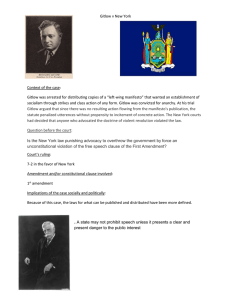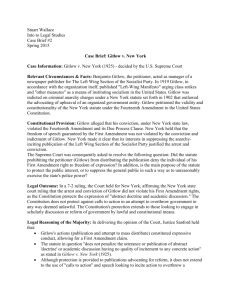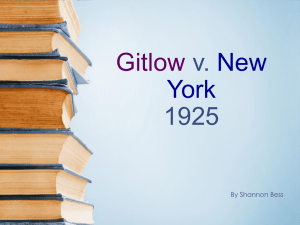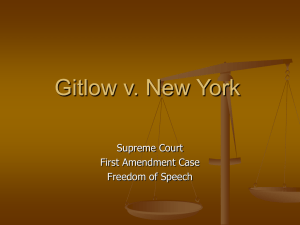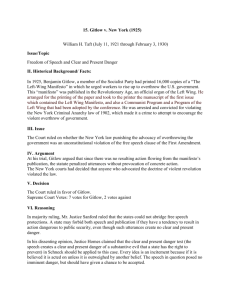Gitlow v. New York SC Decision Summary
advertisement
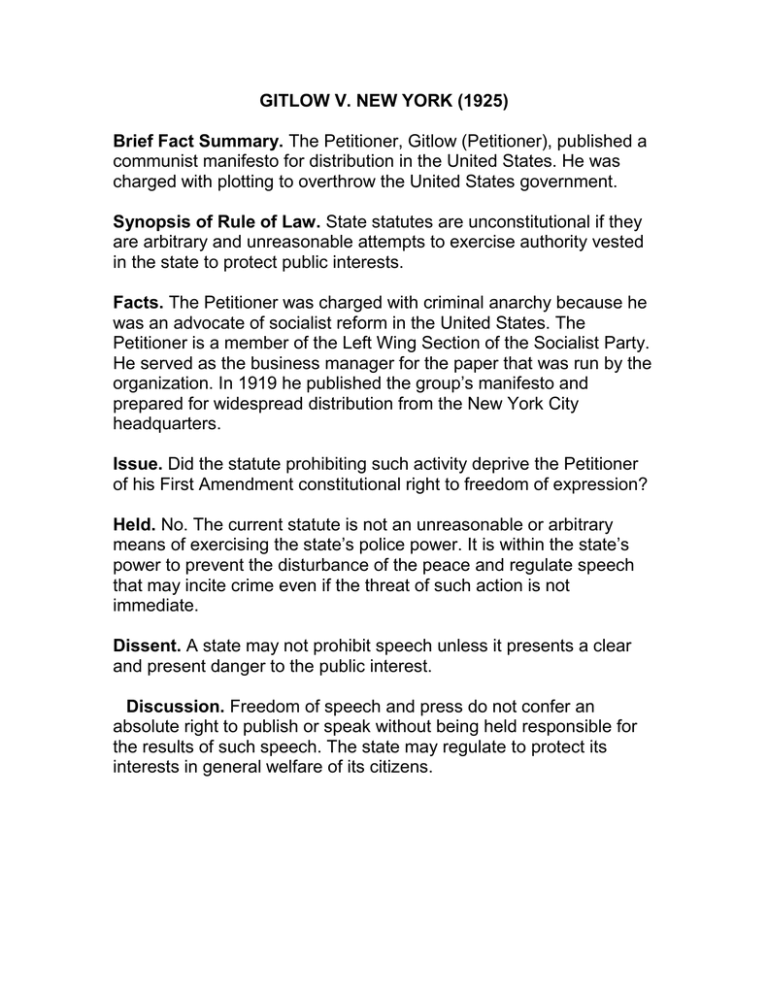
GITLOW V. NEW YORK (1925) Brief Fact Summary. The Petitioner, Gitlow (Petitioner), published a communist manifesto for distribution in the United States. He was charged with plotting to overthrow the United States government. Synopsis of Rule of Law. State statutes are unconstitutional if they are arbitrary and unreasonable attempts to exercise authority vested in the state to protect public interests. Facts. The Petitioner was charged with criminal anarchy because he was an advocate of socialist reform in the United States. The Petitioner is a member of the Left Wing Section of the Socialist Party. He served as the business manager for the paper that was run by the organization. In 1919 he published the group’s manifesto and prepared for widespread distribution from the New York City headquarters. Issue. Did the statute prohibiting such activity deprive the Petitioner of his First Amendment constitutional right to freedom of expression? Held. No. The current statute is not an unreasonable or arbitrary means of exercising the state’s police power. It is within the state’s power to prevent the disturbance of the peace and regulate speech that may incite crime even if the threat of such action is not immediate. Dissent. A state may not prohibit speech unless it presents a clear and present danger to the public interest. Discussion. Freedom of speech and press do not confer an absolute right to publish or speak without being held responsible for the results of such speech. The state may regulate to protect its interests in general welfare of its citizens. Gitlow v. New York Background: The case of Gitlow v. New York was a trial that took place in 1925 with regard to the application of the tenets and precepts expressed within the Constitution of the United States – as well as those expressed within the Amendments; this trial addressed both the Federal Government’s – as well as the individual States’ – responsibility to uphold civil liberties expressed within the Constitution. Benjamin Gitlow, who was considered to be both a Socialist – as well as a potential anarchist threat to the United States government, was charged with a violating ‘Anti-Anarchist’ legislature upheld by the State of New York; prior to his arrest, Gitlow had been charged with releasing publications presumed to be latent with Anti-American rhetoric. Subsequent to his initial conviction, Benjamin Gitlow appealed his conviction, stating that his conviction was in direct violation of both his 1st and 14th Amendment rights expressed in the Constitution; the appeal hearing became what is now considered ‘Gitlow v. New York’. Case Profile: Date of the Trial: November 23, 1923. Gitlow was convicted of violating applicable legislation enacted within the State of New York prohibiting expression considered to be ‘Anti American’, Gitlow appealed his conviction accusing the State of New York of violating his Constitutional rights. The following are the parties named with regard to their involvement in the Gitlow v. New York case: Benjamin Gitlow – the plaintiff - was an social activist and author The State of New York – the defendant – was cited for a violation of Gitlow’s Constitutional rights Verdict Delivered: Benjamin Gitlow remained guilty of his crimes, but the Supreme Court mandated that individual State governments were unable to deny their residents the civil and human rights expressed within the Constitution of the United States. Associated Legislation with regard to Gitlow v. New York: The following statutory regulations were employed with regard to the Gitlow v. New York trial The 1st Amendment of the Constitution ensures that all citizens of the United States are afforded the freedom of speech; this statute also includes the freedom to express oneself in accordance to accepted and undertaken legislation and legality - this statute includes the freedom to join and participate in activities and engagements upon choosing to do so without threat or duress. The 14th Amendment illustrates legislation that disallows the government from infringing on the right(s) to pursue ‘Life, Liberty, and the Pursuit of Happiness’ with regard to any and all citizens of the United States of America – this statute is applicable to all measures of gender, race, religion, and age
